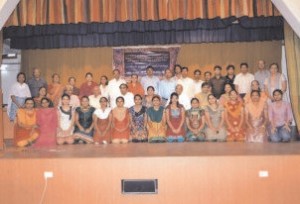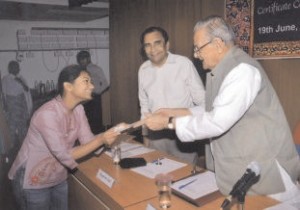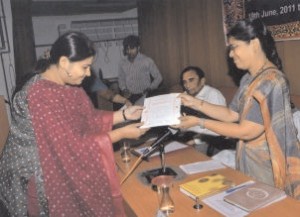Three Institutions Join Hands to Organise a First-Ever Certificated Course In Manuscriptology
India’s abundant treasure of ancient manuscripts lie in libraries, institutions and universities unread and uncatalogued because of the lack of manuscriptologists. It is estimated that there are over ten million manuscripts in India with additional 150,000 Indian manuscripts in Eastern Asia and over 60,000 in various countries in Europe.
Gujarat alone is estimated to have almost two million manuscripts. Of the ten million in India so far only 1.5 million have been listed and catagorised – no records have been created for the rest.
For the first time ever in Gujarat, three institutions, Institute of Jainology (UK & India) (IoJ), Bhandarkar Oriental Research Institute (Pune) (BORI) and Shree Mahavira Jain Aradhna Kendra (Koba) (MJAK) joined hands to provide a 15 day certificated Manuscriptology course in reading ancient languages and composing books on manuscripts.
The course was held in the auditorium of Gujarat Vishwakosh Bhavan It comprised of teaching the understanding of the principles of Manuscriptology and then practical training in studying the manuscripts. 35 students were participating in the course. Over 30 scholars and experts in Manuscriptology both from and outside Gujarat gave talks on a variety of related subjects to the course participants.
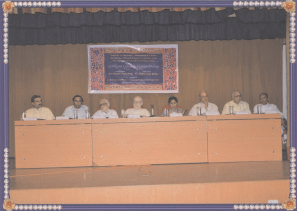
The course was declared open by Adarniya Shree Shrenikbhai Kasturbhai. Padmabhushan Dr Madhusudan was the Chief Guest and he emphasised the importance of this subject for preserving our rich cultural heritage for the future generations. Also present at the opening ceremony were Shree Maitriya Deshpande, Padmashree Kumarpal Desai, Shree Mukeshbhai
Shah, Shree Dhanvant Shah, Shree Kanubhai Shah and Shree Shreenand Bapte who also addressed the invited guests and participants.
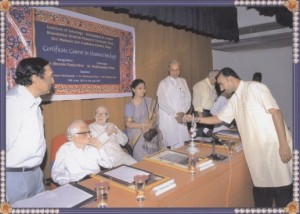
The participants were given a two day practical training identifying and categorising the manuscripts using part of the vast collection of manuscripts at the Achgarya Kailashsuri Gnanmandir in Mahavir Jain Aradhna Kendra, Koba. This Koba institution made a generous offer of employing any student who qualified in Manuscriptology course. The Mumbai Jain Yuvak Sangh made a symbolic donation of Rs 11,000 with an assurance to donate more in the future to sustain the momentum achieved with the first course. Other institutions working in the Manuscriptology field also welcomed the program and assured their full support for the future development of this types of courses.
The main organisers for the course were Shree Nemu Chandaria and Dr Kumarpal Desai from IoJ, Mr Maitriya Deshpande and Mr Shreenand Bapte from BORI and Mr Mukeshbhai Shah and Kanubhai Patel of MJAK.
The 15 day course was closed on 3rd July by Dr Dhirubhai Thakkar, the founder of Gujarat Vishwakosh Project and a Scholar of Gujarati Literature. In his closing remarks he expressed pleasure at seeing so many male and female participants in the course and reiterated the earlier comments of the manuscripts being our great cultural heritage. He said we can view the future with confidence that our vast treasures of manuscripts will be well managed.
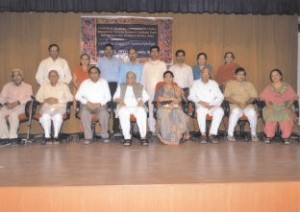
In their closing remarks, the three heads of the institutions also made their observations. Mr Deshpande of BORI said their institution is 97 years old but yet they had learnt a lot from the Institutions in Gujarat.
Dr Kumarpal Desai expressed great pleasure at seeing other institutions participating actively in the project. He went on to say that now the publications on books on manuscripts will be commenced and scholarships will be awarded to those writing thesis on the subject of Manuscriptology.
Mr B Vijay Jain of MJAK said that their collection of over 200,000 manuscripts far exceeds any other collection in India and this course has given them the vision for the future.
Amongst the invited guests at the closing ceremony, Prof Kantibhai Shah, Dr Ramjibhai Sanvalia and Dr Vijay Pandya also expressed their views. Course tutors, Prof Pinky Pandya, Nalini Brambhat and Rajvi Oza also expressed their opinions.
Future course of action was outlined as arranging of workshop/seminars at the participating institutions providing intensive training to the students . The subjects to be taught will be transcription of the ancient scripts, composing books on manuscripts and preservation of manuscripts. Syllabuses for the three courses will be arranged for students, teachers and scholars.
